- Saturday, 21 February 2026
'Working together, Nepal and China can build shared future'
Dr. Huang Zhengduo is the director of Nepal Study Center in the Institute of South Asian Studies, Sichuan University, China. Recently, Dr. Huang was in Nepal. Nanda Lal Tiwari, coordinator of risingnepaldaily.com and Sub Editor of The Rising Nepal, talked with Dr. Huang about the state of relations between Nepal and China as the two neigbours are this year celebrating 70 years of diplomatic relations.
Excerpts:
You have been studying Nepal-China relations from Chinese perspectives. What is your take on the state of Nepal-China relations at present when they are celebrating 70 years of diplomatic relations?
If we look at the trajectory of the relations over seven decades, yes, we can understand that before 1955, the two countries were just like two stranger neighbours with limited contact and communication, because they didn't have any diplomatic relations. They were kept apart due to the tall mountains of the Himalayas. So they could only have some small border trade through the traditional border routes.
But after 1955, they established diplomatic relations and started formal relationship. A step further in their relationship, In 1960, they signed the boundary agreement between the two countries.
That is really a good deal. And also, I think, that is a very successful diplomatic moment. And when we went to 1967, the Aranko Highway was completed with the Chinese aid.
At that time, China still had a lot of challenges, but we still tried our best to help Nepal to be able to construct this highway. In the mid-1990s, Nepal was still in its monarchic period. So it was focused on the relationship with India, and China was also focused on its internal issues.
And when we entered the new century, some great changes took place, something big happened. In 2008, monarchy ended in Nepal and Nepal became Federal Democratic Republic. I remember that in that year, Prachanda (Pushpa Kamal Dahal ‘Prachanda) was elected as the first Prime Minister of the Republic of Nepal. And as he was elected as the Prime Minister, he went to China to participate in the closing ceremony of the Olympic Games. There was some hot debate in Nepal. Prachanda changed the tradition of Nepali Prime Ministers visiting India as their firs foreign visit. He was the first to visit China after being elected as the Prime Minister. So I think that was a very good initiative from the Nepali side to engage in the relationship with China.
And also, at that time, China had become a little bit richer and stronger gradually, willing to look outside. So there were so many opportunities to communicate with each other.
In 2016 and 2017, there are also a lot of things. We signed the MOU of BRI in 2017, in 2016, trade and transit agreement was signed. And in October 2019, Chinese President Xi Jinping paid a state visit to Nepal. That is really a historic moment. The two neighbours upgraded their relationship to Strategic Partnership of Cooperation Featuring Ever-lasting Friendship for Development and Prosperity. Yes, that is really a good, wonderful and historic moment.
And yes, in 2019, there is also a very important agreement. And also this year, Nepal's President Bhandari (Bidya Devi Bhandari) paid a state visit to China.
And last year, Nepal's Prime Minister KP Sharma Oli paid a state visit to China. So there are so many frequent government-level communications.There are also a lot of exchanges at the people-to-people level. Over 500 Nepali students are studying at universities in China.
Sichuan University has signed an MOU with Tribhuvan University. We have a joint short-term program for students majoring in international relations. Up to now, more than 100 students have been trained by that program. We have also launched some seminars or conferences, for instance, the China-Nepal Youth Forum, which is hosted by our Center in China. Also, last year, China Center for South Asian Studies hosted the first Phewa Dialogue in Pokhara, Nepal.
So this time we, Nepal and China, are at a very high level, warm relations. Especially in the political level, we have mutual trust, and built an extensive, deep, and practical cooperation. We also have more cultural exchanges.
We can see that before 1955, there were some problems, especially for the tough geography, because mountains stood as obstacles for regular contacts. It's changed now. We have ambiguous goals now to build more roads and even railways over the same high mountains. And I think, in the future, we can do more. Of course, nowadays we have more cooperation, better relations. We always respect each other, we have a friendly relationship between our countries. Yes, China is an equal partner that makes Nepal feel good. And also, another way, the second way is that China can help Nepal to develop its economy. Because up to now, Nepal is still a least developed country. It needs more roads, maybe power plants or airports. But China can help Nepal through investment and aid under the BRI project or some other programmes.
You rightly talked about BRI. Back in 2017, when Nepal and China signed the Memorandum of Understanding on Belt and Road Initiative, Nepal had high expectations that there would be many BRI projects in Nepal. And China also had some confidence that it would be able to implement many BRI projects in Nepal. But in the last eight years, not even a single BRI project has been completed in Nepal. So, what are the factors for this slow sail?
There are some reasons. In my opinion, the first reason is that there are some financial terms, funding modalities- loan or grants. Nepal seems to be worried a lot about if it should take more loans for projects and if it can repay them in time.
Nepal hopes that China can do some projects with aid, with grants, or with a very soft loan, with even zero interest. But the Chinese side, the Chinese company, the Chinese bank hope to make some returns from investment. They think that projects should be done in a sustainable way.
I think the second reason is the instability of the Nepali politics. You know, the government in Nepal gets frequently changed. If a leader from one party has signed a deal, but maybe a few months later, maybe a leader from the other party will change, will review this kind of project, sometimes even change it. This is a problem.
I think the third reason is the India factor, because India has a special relationship with Nepal, and Nepal has a very close relationship. They share the open borders, similar culture, religions, and also Nepal is a lot dependent on India for trade, or the essential supplies. So Nepali side seems always worried about whether its close relationship with China will upset India. Nepal behaves very cautiously when it gets some cooperation from China. I think this is the main reason.
As a scholar, you may have conducted research or studied many scholarly research on Nepal-China relations. What challenges China has faced in its dealing with Nepal?
Challenges? Yes. Last year when Prime Minister Oli visited China, he said that there were no any issues or problems, but only friendship between Nepal and China.
Yes, I totally agree with him. But as a scholar, I want to share something. If we can say there are some problems, or there are some challenges between our two countries. I think the trade imbalance is a little bit of a problem.
We have lots of trade imbalance which is growing gradually higher since the last decade. But compared with other South Asian countries, for example, India, Bangladesh, Pakistan, even some other countries, volume of trade between China and Nepal is small. The reason is the border, as we have trade through the border and the border passes through tough geography, which creates a lot of problems time and again, just like last month, the flood damaged the Friendship bridge (in Rasuwa). We need to construct robust connectivity infrastructure for trade.
We also need to, the Nepali side, construct more manufacturing industry, where China and Nepal can cooperate together to help improve Nepal's ability of manufacturing industry.
The second is that there are some different cultures. China's national condition is quite different from Nepal’s. We have a different social and political systems. We know that the projects will be debated in Nepal's parliament, maybe criticized by the media, maybe protested by the civil society. China has now understood this reality and considers these before making decisions.
The third is that the people-to-people exchange program needs to be held more. We need to make it easier for people to study, travel, do business in both countries. So in the future, we need to work more on that.
You also talked about the difference between China and Nepal in terms of the socio-political system. So in that sense, as a scholar, Professor Huang, what is the Chinese perspective on Nepal's political parties?
Nepal has lots of political parties. I think the main political parties are UML (CPN-UML), Nepali Congress and Maoist Center (CPN-Maoist Center).
I think we have a pragmatic attitude towards Nepal's political parties, not ideological. I think China cares more about border security or stability. And also we care more about the cooperation between China and Nepal.
It doesn't matter who is in power in Nepal, or who can do more for China, or who is helpful for China. It doesn't matter which party you believe in. Nowadays we have this attitude that we have good relations with major parties, UML, Nepal Congress, Maoist Center, and other new political parties.
We have good relations. We maintain good relations.
You also talked about trade deficit between Nepal and China. Do you think Nepal has lagged behind to take advantage from China’s development compared to other neighbours of China?
That’s a phenomenon. Yes, that is true. I think there are some reasons.
First, the terrain is tough. Geography (that of border) is difficult. As I said before, these two countries are also part of the tallest mountains. And also, these mountains are sometimes obstacles to build some big projects, just like the cross-border railway, we face a lot of problems. The engineering is difficult, and also the cost is extremely expensive. Somebody said that they will spend more than 10 billion US dollar to construct this kind of railway. So I think this way we will face a lot of challenges, just like the engineering is difficult, and also, just like I said before, the financial terms. How to pay? Who will pay this cost of construction? And the commercial returns also pose a problem, because the cost is so expensive.
So when will we get these returns? These are problems. The second is the instability of Nepal's politics. And the frequent changes of the leaders (Prime Ministers) in Nepal. So it is hard for China to make big or long-term deals or projects with Nepal. China seems to be cautious in this regard, because maybe the government in Nepal will fall next month. So China always wishes for political stability in Nepal that it can work together for big projects. That is a very good precondition.
What suggestions would you, as a scholar, offer to Nepal and China so they move forward toward a shared future?
Shared future means mutual benefits, or means good connectivity between two countries. So I think in the future we need to work together to construct some big projects.
I think, the two neighbours try their best to make this railway complete in the next decade. Because we always say that Nepal is a landlocked country. We, China, can try our best to make Nepal a land-linked country. That will also make Nepal join the global supply chain. That is a good choice, good help for Nepal. So I think this is the first.
The second is that we need to do more people-to-people exchanges. In history, we have more than 1,000 interactions. Fa Xian, a Chinese monk, visited Nepal for pilgrimage in antiquity. I think that was a kind of journey to the West, to learn something from Nepal.
Nowadays, a lot of Nepali students are studying in China, or some other training program hosted by China. I think this is a kind of journey to the East. This is a kind of mutual learning. So the civilization can be more rich, will be colorful, through this kind of exchange and mutual learning. So this kind of mutual learning, mutual exchange, can make two countries best understand each other.



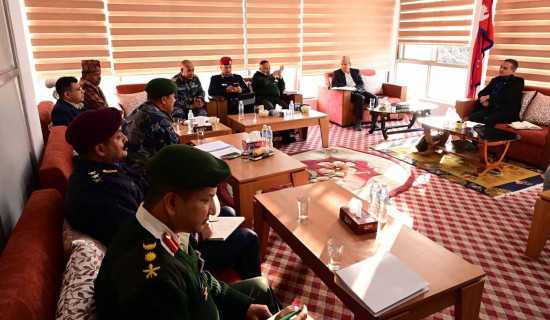
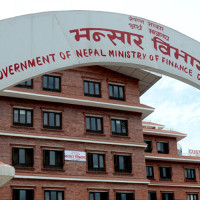
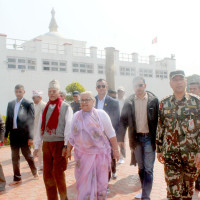
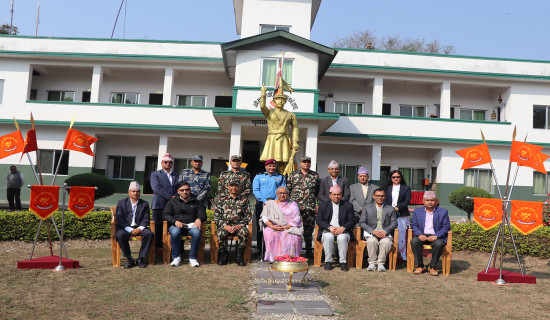


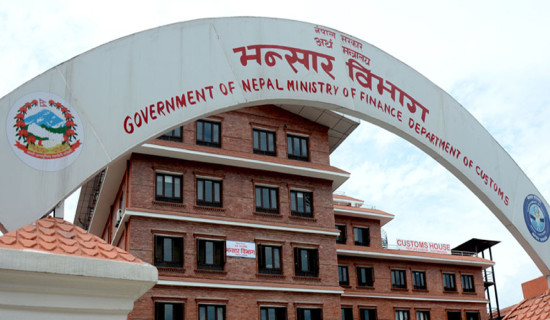
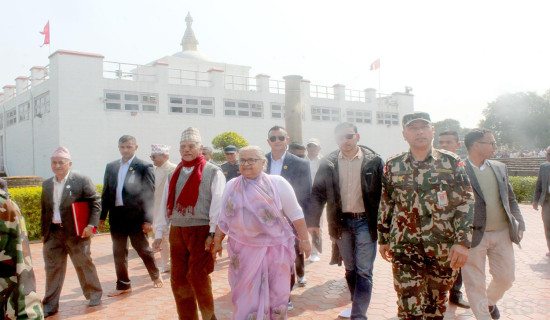
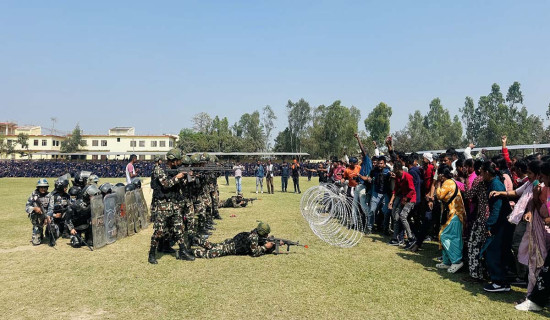
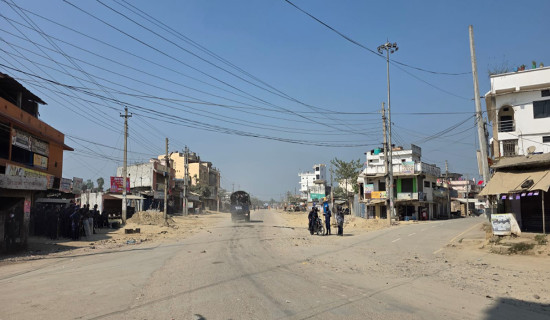

-original-thumb.jpg)